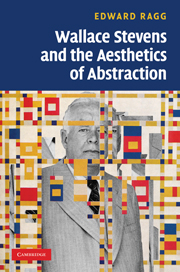Book contents
- Frontmatter
- Contents
- Acknowledgements
- List of Abbreviations
- Introduction: ‘Stevensian’ and the question of abstraction 1935–2009
- 1 The abstract impulse: from anecdote to ‘new romantic’ in Harmonium (1923) and Ideas of Order (1935)
- 2 The turn to abstraction: Owl's Clover (1936) and the ‘un-locatable’ speaker in The Man with the Blue Guitar (1937)
- 3 The ‘in-visible’ abstract: Stevens' idealism from Coleridge to Merleau-Ponty
- 4 Abstract figures: the curious case of the idealist ‘I’
- 5 Abstract appetites: food, wine and the idealist ‘I’
- 6 The pure good of theory: a new abstract emphasis
- 7 Bourgeois abstraction: poetry, painting and the idea of mastery in late Stevens
- Bibliography
- Index
5 - Abstract appetites: food, wine and the idealist ‘I’
Published online by Cambridge University Press: 04 August 2010
- Frontmatter
- Contents
- Acknowledgements
- List of Abbreviations
- Introduction: ‘Stevensian’ and the question of abstraction 1935–2009
- 1 The abstract impulse: from anecdote to ‘new romantic’ in Harmonium (1923) and Ideas of Order (1935)
- 2 The turn to abstraction: Owl's Clover (1936) and the ‘un-locatable’ speaker in The Man with the Blue Guitar (1937)
- 3 The ‘in-visible’ abstract: Stevens' idealism from Coleridge to Merleau-Ponty
- 4 Abstract figures: the curious case of the idealist ‘I’
- 5 Abstract appetites: food, wine and the idealist ‘I’
- 6 The pure good of theory: a new abstract emphasis
- 7 Bourgeois abstraction: poetry, painting and the idea of mastery in late Stevens
- Bibliography
- Index
Summary
TASTING ‘CERTAIN PHENOMENA OF SOUND’ (1942)
Stevens' gastronomic references could inform an entire study in their own right. The elusive ‘lobster Bombay’, mango chutney, Burgundian wines (Meursault, Le Montrachet, Chablis, Corton), Champagne, persimmons, pears, peaches, strawberries, even a glass of water: these are only some of the stimulants affecting Stevens' literal and abstractive palate. Gastronomy in Stevens often unites ‘high ideas’ with living, immediate pleasures. As the poet wrote to Henry Church: ‘Being, as I think of it, is not a science but merely eating duck, or doing some such thing.’ Such calculated flippancy is a reminder to Stevens' more earnest Heideggerian readers that ‘being’ was hardly the ‘be-all and end-all’ for this poet. Numerous Stevens poems refer to bread and wine, where such staples imply imaginative and domestic well-being, whether present or disturbingly absent. Following Santayana, Stevens gave the word ‘poverty’ a particular resonance; sensing economic and imaginative hardships frequently conjoin. Domestic comforts thus take on aesthetic significance in the poetry, not least through gastronomy. That significance chimes with the argument I make for Stevensian abstraction: namely, that aesthetic meditation re-connects us with the world and that an abstract aesthetic potentially maximizes its number of gourmet readers.
Stevens no doubt delighted in Mauron's claim that ‘[w]ithout the originality of artists our human world would lose half its taste’ (underlining the phrase in his personal copy).
- Type
- Chapter
- Information
- Wallace Stevens and the Aesthetics of Abstraction , pp. 136 - 165Publisher: Cambridge University PressPrint publication year: 2010



